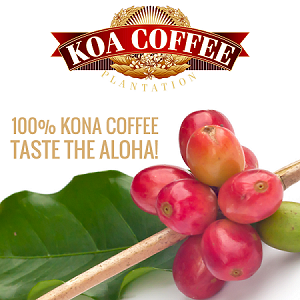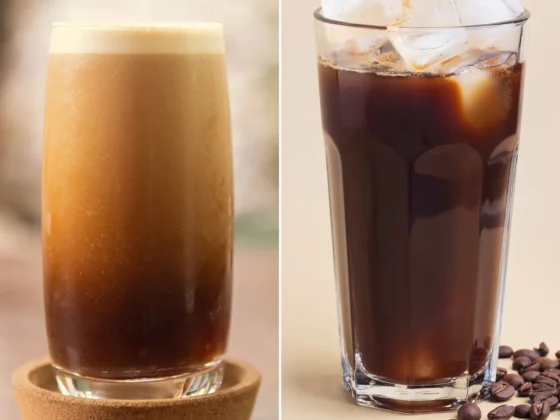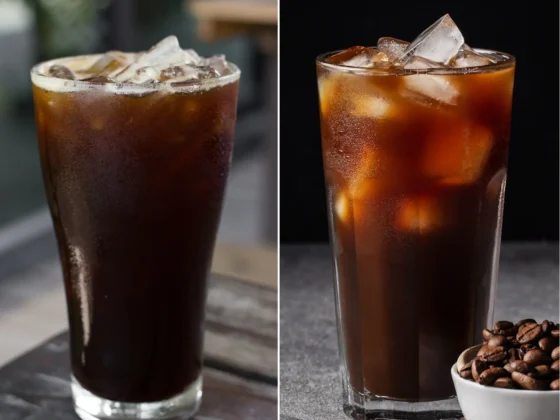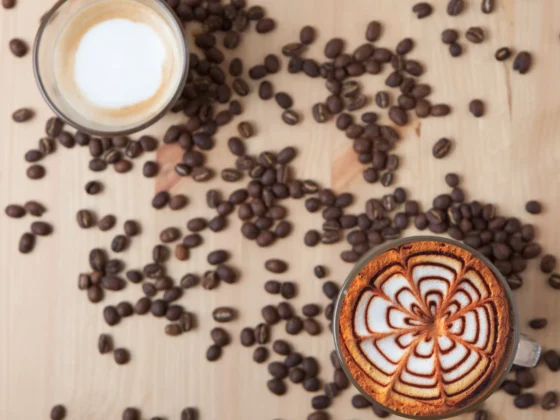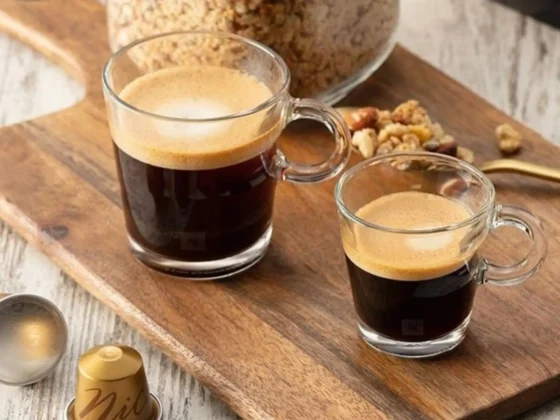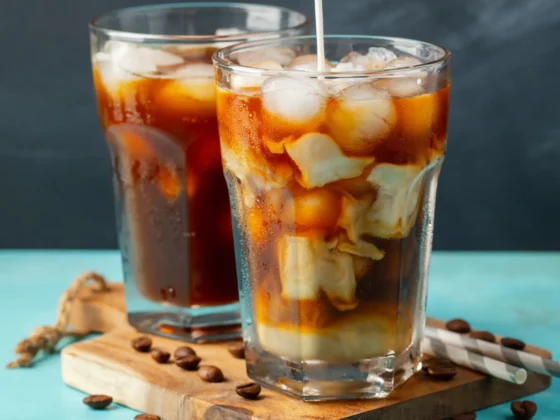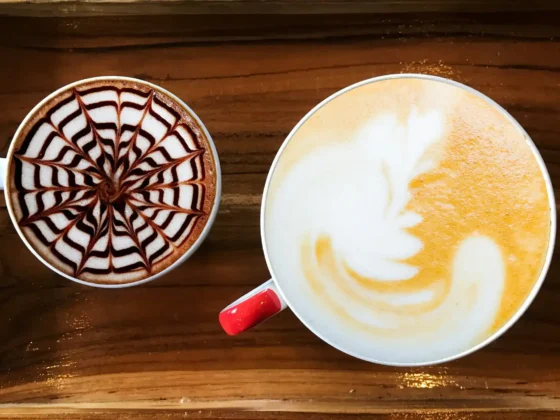As we navigate the intricate world of children-friendly beverages, one quaint, trending drink that stands out is the babyccino. So, what is a babyccino drink, you might wonder? This delightfully playful yet grown-up beverage, often referred to as a kid’s first taste of coffee culture, has been making waves globally for its ability to make children feel part of the sophisticated café experience. Aiming to provide a complete guide for parents, this article unravels the concept of the babyccino drink – its origins, ingredients, popularity, and ways to prepare it at home. Dive in with us as we explore this exciting addition to the child-friendly beverage menu, helping parents understand it better and make informed decisions about introducing it to their little ones.
Babyccino: Key Takeaway
- The Coffee-Free Kid’s Beverage: A babyccino is a caffeine-free, child-friendly drink that allows children to participate in café culture without the potential negative effects of coffee.
- Healthy and Customizable: With its main ingredients being milk and foam, a babyccino provides essential nutrients like calcium and protein and can be easily customized with dairy-free alternatives and different flavors.
- Nutrition in Moderation: While babyccinos can serve as a fun treat, parents need to be mindful of the frequency of consumption and potential for added sugars, ensuring they maintain a balanced diet for their children.
- Homemade Babyccino Fun: Making babyccinos at home can be a delightful activity for parents and children, providing a chance to get creative with various recipes and toppings.
- Social Impact of Babyccinos: The rise of babyccinos has made coffee shops more family-friendly, influenced parental choices, and prompted innovation in the children’s beverage market.
Introduction to Babyccino Drinks
Stepping into the intriguing world of children’s beverages, we encounter a trendy delight – the babyccino. Originally crafted to offer children a slice of the adult coffee culture, these drinks have now cemented their place in cafés worldwide. In this section, we delve into what exactly a babyccino drink is, trace its origins, and explore why these charming drinks have found a fanbase among the little ones. Let’s journey together into the frothy, delicious world of babyccinos!
What is a Babyccino Drink?

A babyccino drink is a beverage specifically tailored for children to mimic the experience of adult café drinks like cappuccinos. It typically consists of steamed milk and foam, sometimes topped off with a sprinkle of cocoa powder or cinnamon for added flavor. The critical part of a babyccino is that it contains no caffeine, making it safe and suitable for children. Some cafés also offer an alternate version of the babyccino made with decaffeinated coffee for older kids seeking a slightly more authentic experience.
The Origin of Babyccinos
The charming world of babyccinos traces its roots back to Australian cafés in the late 1990s. As Australia’s coffee culture flourished, café owners sought a way to engage young customers who accompanied their parents. The drink quickly caught on and soon made its way across the globe to other coffee-loving nations like the United States, the United Kingdom, and Canada. Today, babyccinos are a regular feature in many cafés worldwide, especially those in urban centers where coffee culture thrives.
Why Babyccinos are Popular Among Children

Babyccinos owe their popularity to several unique factors:
- Mimicking Adults: Children often love to imitate grown-ups. A babyccino, served in a small espresso cup, gives them the chance to mirror their parents’ coffee-drinking habits in a safe and fun way.
- Taste: Unlike traditional coffee, a babyccino is sweet, milky, and often flavored with cocoa or cinnamon, appealing to a child’s taste buds.
- Experience: Many cafes serve babyccinos with a special touch, like a marshmallow on the side, which enhances the overall experience for the child.
- Inclusion: A babyccino makes children feel included in café culture. It allows them to order their ‘coffee,’ sit with the grown-ups, and enjoy their drink, making them feel more mature and part of the adult conversation.
This beverage’s appeal goes beyond just the drink itself; it’s about the experience it provides. As a parent, understanding this can help you appreciate the allure of babyccinos for your little one.
Ingredients and Variations of Babyccinos
Navigating through the delightful journey of babyccinos, it’s important to examine the ingredients that make up these beloved children’s drinks. From the basic essentials to a range of customizable alternatives and flavor variations, understanding the composition of babyccinos can help parents tailor the beverage to their child’s preferences and dietary needs. Let’s delve into the essential components of a babyccino, explore dairy-free alternatives, and discover the plethora of flavors and toppings that can enhance this drink.
Common Ingredients in Babyccino Drinks

At its simplest, a babyccino drink comprises two basic ingredients – milk and foam. The milk is heated and frothed to create a smooth, creamy texture that’s both tasty and safe for children. The foam, created by whisking or frothing the milk, gives the drink its characteristically cappuccino-like appearance. As discussed, some establishments or homes might choose to sprinkle a bit of cocoa powder or cinnamon on top to add a touch of flavor and visual appeal.
Dairy-Free Alternatives for Babyccinos
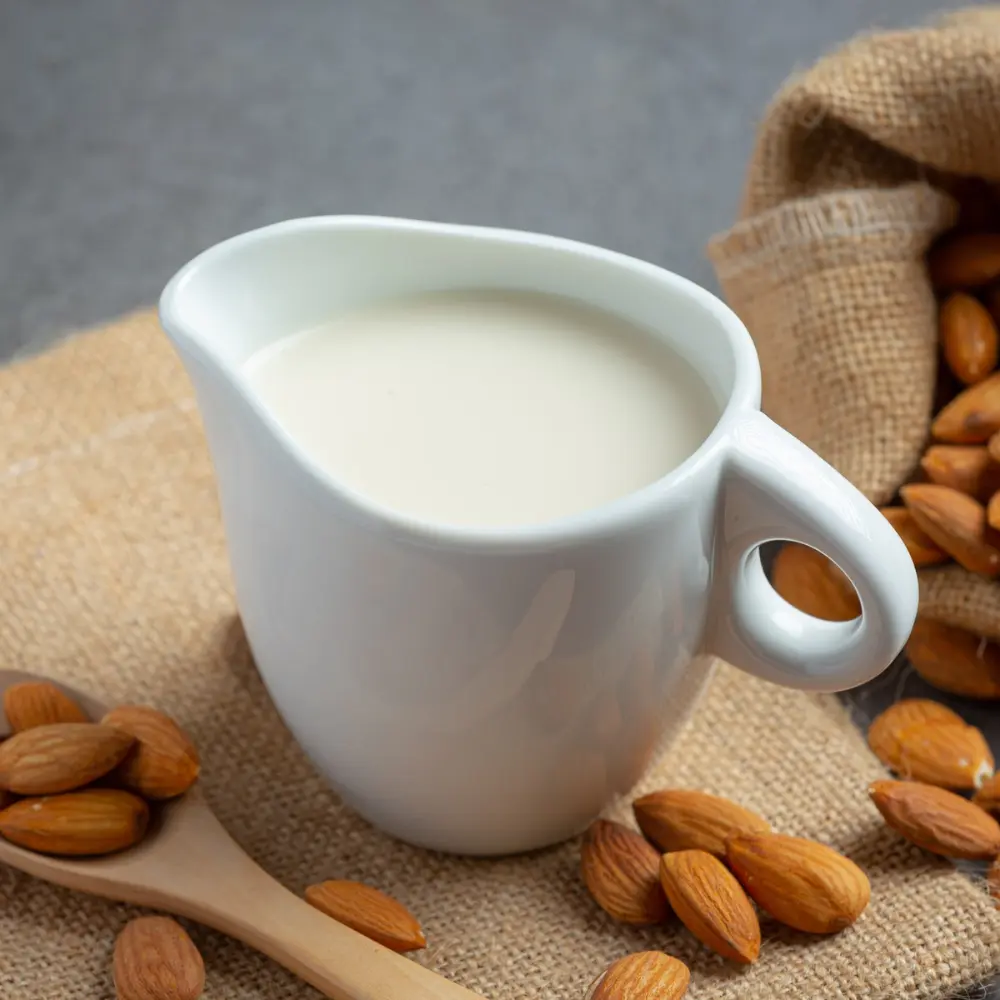
Recognizing that not all children can or choose to consume dairy products, many cafés and parents have adapted the babyccino to meet these dietary requirements. Here are some popular dairy-free alternatives used in babyccinos:
- Soy Milk: Soy milk is one of the most common substitutes for dairy milk in babyccinos. It froths well and has a mild, creamy taste that suits the drink.
- Almond Milk: Almond milk provides a slightly sweet and nutty flavor to the babyccino, although it doesn’t froth as much as dairy milk or soy milk.
- Oat Milk: Recently, oat milk has gained popularity due to its rich, creamy texture and ability to froth quite well, making it an excellent choice for babyccinos.
Flavor Variations and Toppings for Babyccinos

While the traditional babyccino is kept simple with milk and foam, there are numerous ways to jazz up the drink with various flavor variations and toppings. Here are some options:
- Cocoa Powder: A sprinkle of cocoa powder not only gives the drink a lovely chocolatey touch but also makes it visually appealing.
- Cinnamon: Cinnamon can be dusted on top for a slightly spicy, sweet twist to the babyccino.
- Honey: A dash of honey can add natural sweetness to the babyccino, especially when using dairy-free alternatives that may lack the inherent sweetness of regular milk.
- Marshmallows or Whipped Cream: Some cafés and parents like to serve babyccinos with a small marshmallow or a dollop of whipped cream on the side or on top for an extra special treat.
By understanding these various ingredients, dairy-free alternatives, and flavor additions, parents can custom-create a babyccino that not only suits their child’s tastes but also meets any dietary restrictions they might have.
Benefits and Considerations of Babyccino Drinks
Before diving into the world of babyccinos, it’s essential to understand the potential benefits and considerations associated with these beverages. While they can serve as a fun, coffee-free alternative for kids, nutritional aspects and appropriate consumption must also be taken into account. In this section, we’ll explore these facets, giving parents a well-rounded understanding of babyccinos.
Babyccinos as a Coffee Alternative for Kids

Babyccinos provide an excellent coffee alternative for kids, allowing them to participate in café culture in a safe, age-appropriate way. Since they are caffeine-free, they avoid the potential negative effects of caffeine on young children, such as increased heart rate, nervousness, and digestive issues. (1) By offering a babyccino, parents can give their children the feeling of being grown-up without exposing them to the potential risks associated with coffee consumption at a young age.
Nutritional Aspects of Babyccino Drinks
From a nutritional perspective, a basic babyccino made from milk and foam can provide essential nutrients found in milk, such as calcium, vitamin D, and protein, which are vital for a child’s growth and development. (2) However, if flavored with sweet toppings or added sugars, the nutritional profile can change, potentially contributing to excessive calorie intake. Dairy-free alternatives can also vary in their nutritional content, with some offering less protein or calcium than traditional cow’s milk.
It’s worth noting that babyccinos should not replace regular milk intake in younger children, especially those under the age of two, who require the full fat and nutritional benefits of whole milk for their development.
Moderation and Age-Appropriate Consumption
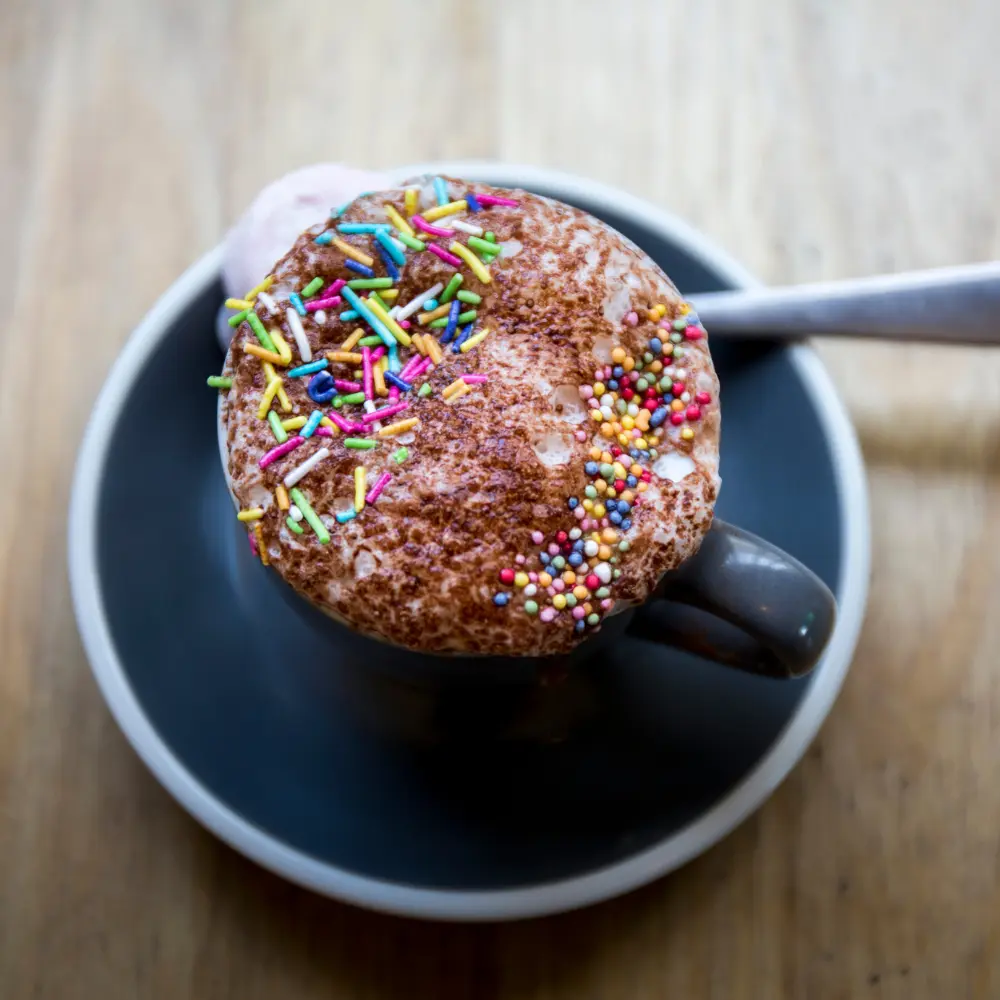
While babyccinos can be a fun treat, it’s important that they’re consumed in moderation. These drinks can sometimes become a preferred choice over healthier beverages, such as water or plain milk if offered too frequently. Moreover, when loaded with sugary toppings, they can contribute to a higher sugar intake than recommended for young children.
The age at which children start consuming babyccinos is also worth considering. For very young toddlers, it’s advisable to stick to plain milk as their primary drink. Babyccinos can be introduced as an occasional treat as they grow older and become more curious about the café culture their parents enjoy.
Through understanding these benefits and considerations, parents can make informed decisions about when and how to introduce babyccino drinks into their child’s diet.
Making Babyccinos at Home
Having a babyccino at a café can be a charming experience, but making these delightful beverages at home can be just as fun and even more personalized. By following a simple guide to making a basic babyccino, experimenting with creative homemade recipes, and learning some tips for serving and presentation, parents can turn any regular day into a special café-like experience for their children.
Step-by-Step Guide to Making a Basic Babyccino

Here’s a simple guide to making your child their very own homemade babyccino:
- Heat the Milk: Take half a cup of milk (or a dairy-free alternative) and heat it gently on the stove. Be careful not to boil the milk – just warm it until it’s nice and hot.
- Froth the Milk: Once heated, use a frother to whisk the milk until it’s creamy and frothy. If you don’t have a frother, you can also use a whisk or shake it in a lidded jar.
- Serve: Pour the frothy milk into a small espresso cup or any other small mug. You can spoon the extra foam on top if desired.
- Add Toppings: This step is optional but adds a nice touch. Sprinkle a bit of cocoa powder or cinnamon on top for extra flavor and visual appeal.
Creative Homemade Babyccino Recipes
While the basic babyccino is quite straightforward, you can get creative and try various recipes to add more flavors and excitement. Here are a couple of ideas:
- Honey Almond Babyccino: Use almond milk as your base, add a bit of honey for sweetness, and top with a sprinkle of almond flakes for a nutritious twist.
- Chocolate Babyccino: Add a teaspoon of unsweetened cocoa powder to your milk before heating it. This will create a warm, chocolatey version of the babyccino that’s sure to be a hit.
- Vanilla Cinnamon Babyccino: Add a splash of vanilla extract to the milk before heating and frothing, then top with a dusting of cinnamon. This will give a wonderful aroma and flavor to your babyccino.
Tips for Serving and Presentation of Babyccinos

The joy of a babyccino isn’t just in the drinking, but also in the presentation. Here are some tips to make your homemade babyccino even more special:
- Use Small Cups: Serving the babyccino in a small espresso cup or a small-sized mug gives the feeling of a real café experience.
- Add a Treat on the Side: Serve the babyccino with a small cookie or a marshmallow on the side, just like they do at many cafés.
- Use Fun Toppings: Apart from the usual cocoa or cinnamon, consider using fun and colorful toppings like sprinkles or edible glitter for an extra special touch.
Creating babyccinos at home can be a wonderful activity that not only results in a tasty drink but also creates fun, memorable moments for parents and children.
Babyccino Culture and Social Impact
The emergence of babyccinos has undeniably left a mark on coffee culture and the broader beverage industry, adding a unique layer to social dynamics in coffee shops and affecting parental decisions. In this section, we explore the babyccino’s place in coffee shops and cafes, understand parental perspectives on babyccino consumption, and discuss the implications for the evolving children’s beverage market.
Babyccinos in Coffee Shops and Cafes
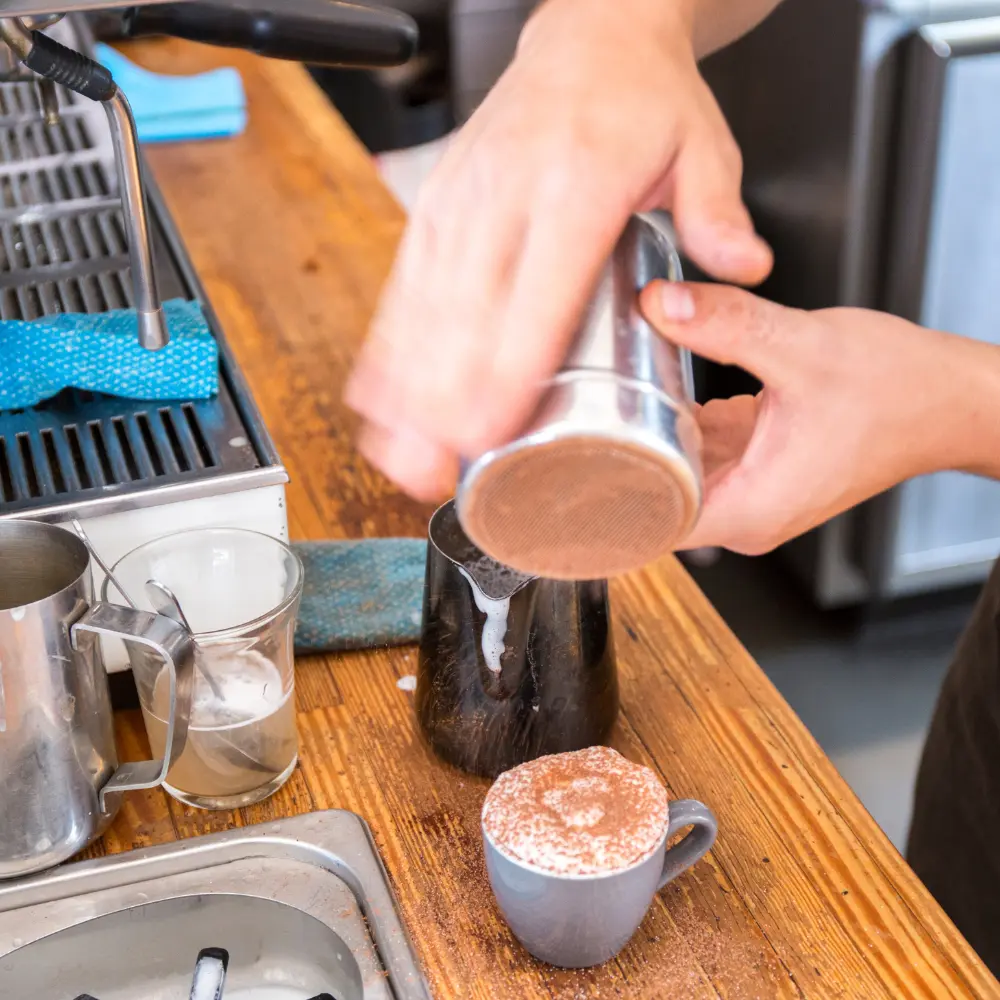
Over the years, babyccinos have become a regular feature in many coffee shops and cafes worldwide. These establishments have embraced the drink as a way to create a family-friendly environment and engage young customers. It’s not uncommon to see children excitedly waiting for their frothy treat, served just like their parents’ coffee. Moreover, cafes often go the extra mile by adding small touches like marshmallows, sprinkles, or even animal-shaped foam art, enhancing the overall babyccino experience. Thus, babyccinos have had a profound impact on the café culture, shaping it to be more inclusive of young patrons.
Parental Perspectives on Babyccino Consumption
Parents’ views on babyccino consumption can vary. Many parents appreciate the concept, viewing it as a fun treat that allows their children to participate in café culture without consuming caffeine. However, others express concern about introducing café habits too early, and some are mindful of the potential for added sugars if sweet toppings are used excessively. These differing perspectives highlight the importance of moderation and balanced nutrition when incorporating babyccinos into a child’s diet.
Babyccinos and the Evolving Children’s Beverage Market
The popularity of babyccinos has also impacted the wider children’s beverage market. Their success has demonstrated the demand for specialty children’s beverages that mirror adult options, resulting in a trend toward the development of other sophisticated, child-friendly drinks. Moreover, the rise of babyccinos has highlighted the need for variety in children’s beverages that cater to different tastes and dietary needs, pushing the industry to innovate. Thus, the babyccino’s impact extends beyond the confines of the café, influencing broader market trends and product development.
In sum, the babyccino phenomenon is more than just a frothy drink; it’s a reflection of evolving social trends, parental choices, and market dynamics in the world of beverages. As this trend continues to evolve, it will be fascinating to see what other child-friendly creations the beverage industry brews up next.
Conclusion
The babyccino, a delightful concoction of milk and foam, has evolved from a novel idea into a staple in coffee shops around the globe. From understanding what a babyccino drink is to exploring its origins, popularity among children, ingredient variations, and nutritional aspects, we’ve delved deep into the world of this child-friendly beverage. We’ve also discussed the joys of crafting homemade babyccinos and pondered the social impact this trend has had on café culture and the broader children’s beverage market.
In essence, the babyccino offers more than just a cute, child-friendly version of an adult coffee drink. It’s an opportunity for children to feel included in the adult world, albeit in a safe, age-appropriate way. It’s also a creative outlet for parents and cafes to provide unique beverage experiences for the young ones. As we’ve seen, the babyccino is much more than a frothy cup of warm milk – it’s a symbol of inclusivity, innovation, and the evolving tastes of the youngest generation.
As with any dietary choice, moderation, and nutritional balance remain key when integrating babyccinos into a child’s diet. But with an understanding of these aspects, parents can confidently navigate the exciting and delicious world of babyccinos. Whether you’re a parent looking to introduce your child to babyccinos or just curious about this trending beverage, we hope this guide has offered insightful answers to your question: “What Is a Babyccino Drink?”
FAQ
Can babyccinos be made without dairy?
Yes, babyccinos can be made with dairy-free alternatives such as almond milk, oat milk, or soy milk.
At what age can children start having babyccinos?
While there's no strict age limit, it's advisable to introduce babyccinos as an occasional treat when children grow older and show curiosity toward café culture.
Are babyccinos safe for children with allergies?
Babyccinos can be safe for children with allergies, provided you use allergen-free ingredients, such as dairy-free milks for lactose-intolerant children.
How did babyccinos become popular?
Babyccinos gained popularity as they allowed children to participate in café culture in a fun, age-appropriate way, creating a more family-friendly environment in coffee shops.

